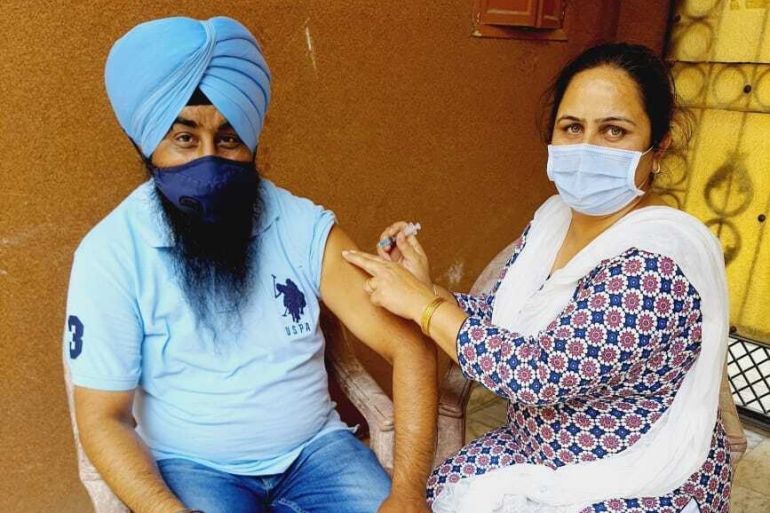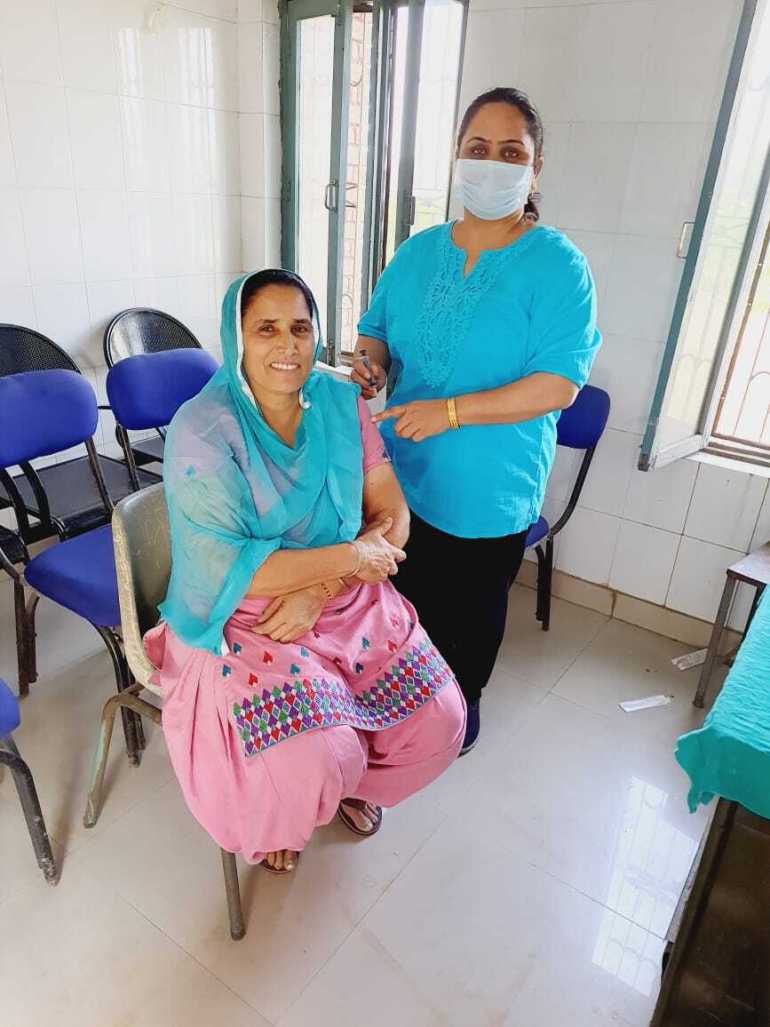‘I don’t feel even 1 percent safe’: An Indian COVID vaccine nurse
A Punjabi nurse who is suffering the effects of long COVID describes what it is like working in a vaccine clinic.

Nina Sharma, 40, a nurse responsible for administering COVID vaccines at a government hospital in Nawanshahr, in the north Indian state of Punjab, says she never feels safe at work, “not even 1 percent”.
“I have to communicate with a lot of people. Doctors can keep a distance but there’s no way we [nurses] can,” she says. The lack of social distancing and inadequate provision of personal protective equipment (PPE) makes it almost impossible to keep them “completely safe”, she adds. “We are only given masks and sanitiser; I have had to buy my own gloves.”
Keep reading
list of 4 itemsIndia COVID crisis: ‘A graveyard of the young’
India COVID crisis: ‘My dad still doesn’t know my mum has died’
India COVID crisis: ‘If I don’t work my children will starve’
Nina, who trained to be a nurse out of necessity when her husband died 13 years ago and she was left to provide for her daughter, explains: “I never would’ve imagined it to be like this. Since COVID-19 happened life has been disturbed.”
Responsible for administering vaccines at the hospital, Nina’s shifts each day have been extended by several hours, without any additional pay. She works from 8am to 5pm.
“The vaccine centre is very busy,” she says. “I am responsible for delivering 100 to 150 vaccines a day which I have to register online afterwards. It is a mentally stressful job, especially when you can’t be sure who has COVID or not.”
A second wave of COVID-19 has exacerbated the challenges health workers face as the country’s healthcare system struggles to cope with record levels of daily cases and hospital admissions. Nina is playing a pivotal role in helping to combat the crisis by administering vaccines. But vaccine hesitancy and anti-mask attitudes – which are more prevalent in the villages of Punjab than in India’s larger cities – increase the risk for workers like Nina.
She describes how people become angry when told to wear a mask: “If you ask them to wear a mask they will say ‘we don’t have corona’. Some people still think ‘if we get vaccinated we will die’, or ‘we won’t be able to have children’,” she says.
Nina tested positive for COVID-19 in February this year – 15 days after taking part in a vaccine trial the government encouraged health workers to participate in. She suffered typical coronavirus symptoms: “I was very ill for five days, I had a high-grade fever and a cough; I didn’t have sense of taste or smell. My body became completely helpless from the fever, I couldn’t make food for myself,” Nina says.
As she lives alone – her only daughter now lives in Canada – she had to take care of herself. “If a person is alone they begin to think about a lot of things … I could’ve died without seeing my daughter,” she says.
While Nina’s parents also live in Punjab, she has been isolated from them due to their health conditions. “When you are ill you can normally invite someone over to take care of you or keep you company, but you can’t do that because of the nature of this virus. That makes it very lonely.”
Nina received a “Mission Fateh” kit from the hospital to help with her recovery. Mission Fateh was an initiative launched by the Punjab government in an effort to stop the spread of COVID-19. The kits include items such as an oximeter (a hand-held device that measures oxygen levels in the blood), thermometer, multivitamins, masks, paracetamol and sanitiser. “This was very good medicine and helped my recovery. The kits last about 10 days. Although, I don’t know whether these are still being provided as cases rise,” Nina explains.

Three months later, however, Nina is experiencing long COVID – the effects of COVID-19 that continue for weeks or months beyond the initial illness. “Where I could walk 5km a day before, I can barely walk two steps now. I start to feel breathless and my legs ache.” She says other colleagues in her department who also caught coronavirus have told her they are experiencing the same. They all believe they haven’t had enough rest or time to recover.
“I wanted more time off after having COVID-19 because I felt so weak, but I wasn’t granted any. If I take time off without pay how will I run my house? How will I feed myself?” Nina says. “We have done so much work as front line workers for sampling and immunisations, we are risking our lives every day. We need to raise our children – just pay us fairly.”
Nina went on strike last month alongside other health workers in Punjab over pay and lack of adequate leave for those who catch COVID. While some states such as Haryana have doubled pay for front-line workers since the start of the pandemic, no extra holidays or pay rises have been granted in Punjab.
While states like Uttar Pradesh and Delhi have reported severe shortages in beds and oxygen, Nina says that the situation is not as bad in her hospital. But she believes it will not be long before they face a similar crisis.
The Punjab government has reported that there is not enough oxygen or vaccines to meet the state’s demand. It is currently administering nearly 25 percent fewer doses of vaccines than it was last month. Punjab had planned to begin vaccinating everyone aged above 18, however, the state has not been given the number of doses it was promised, which has led many to criticise the government’s handling of the pandemic.
“When the government let us down, the community pulled together,” Nina says. “Something I will always remember about this pandemic is how people helped each other as much as they were able to. When the cases first reached Punjab, the gurdwaras were very good and brought food to the hospitals for the patients. They did a lot of seva [an act of selfless service practised in the Sikh community]. But how much can they do? It is not sustainable to rely on the gurdwaras for help.”
Confusing messaging was cited as one of the main factors leading to the surge of cases during this second wave of COVID-19 as Prime Minister Narendra Modi encouraged the public to wear face masks yet addressed large gatherings of unmasked people during his election campaigns.
Nina remains clear in her message to people: “Every person should think carefully and wear a mask and wash your hands if asked to. It could mean you saving your family.”